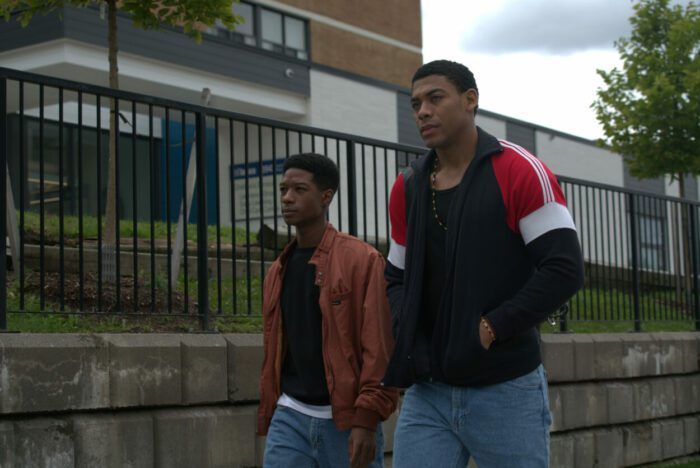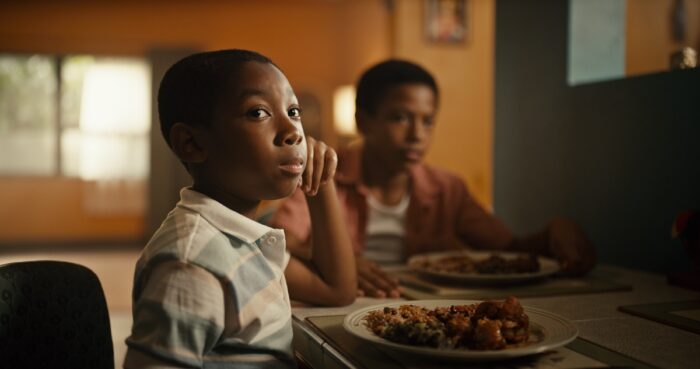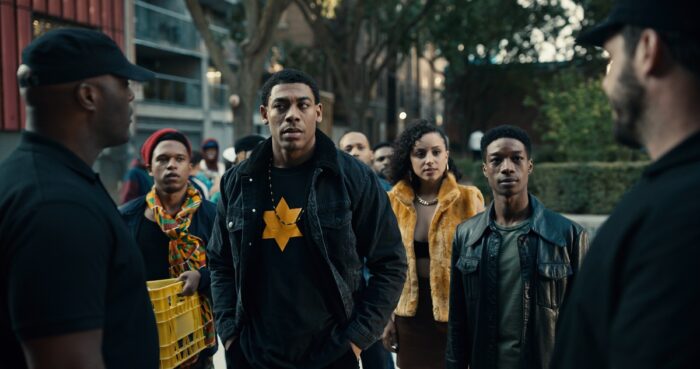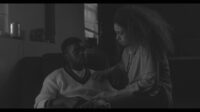A breakout hit at Toronto International and BFI London Film Festivals last year, the acclaimed Canadian drama Brother arrives in North American theaters and streaming services this week. With finely honed performances, a rich visual design, and a sincere message about the challenges of growing up Black and male, Brother‘s is a timely story about the deep bond between two sibling sons of immigrants, their lives a study in empathy and compassion in the face of a looming tragedy.
Francis (Lamar Johnson) and Michael (Aaron Pierre) are the two brothers, sons of Caribbean immigrants, maturing into two very different young men in the summer of 1991 in Scarborough, a multi-ethnic district of Toronto bordering Lake Ontario. Francis is tall, robust, athletic, and outgoing: everyone in the local school and community knows and seems to like him, even while his imposing physique poses an unspoken threat when he isn’t among friends or family. Michael is practically half his size, quiet and unassuming, living in his brother’s shadow—and at times, needing his protection from local bullies.

While Michael tentatively pursues a romantic relationship with schoolmate Aisha (Kiana Madeira), Francis falls in love with hip-hop and its ubiquitous culture of fashion, hair-styling, and performance. It’s a passion that leads him out of school, where he’s been beaten into vo-tech-track submission, and into a salon, where his good mate Jelly (Lovell Adams-Gray) and he explore a sexual relationship. As the two brothers, both Johnson and Pierre are excellent. The film smolders with a slow burn that invites strong, controlled performances from both, and while the two do not resemble each other in any way—the film instead makes much of their physical contrast—Johnson and Pierre use their ample onscreen time to create a loving, protective bond between the two. (The actors are old-ish for the roles at 29, about a decade past the characters they play, and at times Johnson in particular can look even older.)
Closely adapting David Chariandy’s award-winning 2017 novel of the same name, director-writer Clement Virgo’s script takes place in two timelines. Francis and Lamar are exploring their maturity as young Black men in the sweltering summer of 1991, framed by a unique opening device: Francis guides little brother Michael on a daredevil climb of one of Scarborough’s electrical towers, a metaphor for his support and guidance the film returns to on several occasions. Another timeline is set ten years earlier as much-younger versions of the two brothers (played by Jacob Williams and Sebastian Singh) and their mother struggle with life in their immigrant neighborhood, lending depth and insight to the two young men’s developing—and, for a time, fraying—relationship.

Chariandy’s novel is something of a Canadian treasure and literary phenomenon, winning the Rogers Writers’ Trust Fiction Prize, Ethel Wilson Fiction Prize, and Toronto Book Award and becoming the 2019 Canada Reads selection. From it Virgo hews closely to the novel’s back-and-forth narrative structure between the two timelines. What works perfectly well on the page is less impactful onscreen as the fairly constant shifts between the two timelines interrupt the film’s narrative continuity and momentum: one scene unfolds in one timeline, only to be abandoned for the other without any immediate consequence for its characters. That most scenes unfold with the same deliberate pace, tone, and even slow-crawl cinematography, excellent as it is, leaves this film version of Brother with a little less narrative impact than its source, its performances, and its story deserve.
Guy Godfrey’s striking cinematography is reminiscent of James Laxton’s in Barry Jenkins’ If Beale Street Could Talk, just as Todor Kobakov’s musical score mines territory similar to Nicholas Britell’s there and in Moonlight, if without the same effect. The thump and joy of the hip-hop Francis in particular loves so much finds its way onscreen only very occasionally in what is mostly a serious, somber affair with a quiet dignity that can verge on monotony. That pace and style is a deliberate choice aligned with a faithful approach to the novel’s adaptation that might have felt a good deal more immediate were it simply more linear and direct: the tragedy that ultimately befalls one of the brothers is an important one, and tales like Francis and Michael’s deserve telling.

Constantly looming in the film’s final act is an impending sense of dread, especially as the adult Francis’ choices become more reckless. He’s a young man whose very existence poses an assumed threat to the police, and he knows it. Does he embrace who he is and challenge authority, or is he to back down from it, meekly, and accept subservience? And what can little Michael, nearly always in Francis’ shadow, do to influence his more extroverted, more powerful sibling, even when he fears Francis’ actions will ultimately impact them all? Their narrative may take place some 30 years in the past, but Toronto is still plagued by the racism of its police and and the mistrust between the force and the community it is meant to serve.
Throughout, the film’s performances and technique are impeccable. Its lead brothers are excellent, if a few characters—especially the promising deejay Jelly as Francis’ lover and even, despite a considerable amount of screen time, Marsha Stephanie Blake’s Ruth, the two boys’ mother—get lost in the shuffle. More important is the film’s message: to be, to become, a black man is fraught with a complexity that can all too easily turn tragic. If along the way, Brother’s narrative momentum slows in the shuffle of timelines, one can still admire the fine performances, ones that convey that message in a finely wrought, carefully honed, and still-all-too-timely film.
Directed and written by Clement Virgo from the novel by David Chariandy, starring Lamar Johnson and Aaron Pierre, Brother debuts in theaters and on demand August 4, 2023. In English, 120 minutes.




